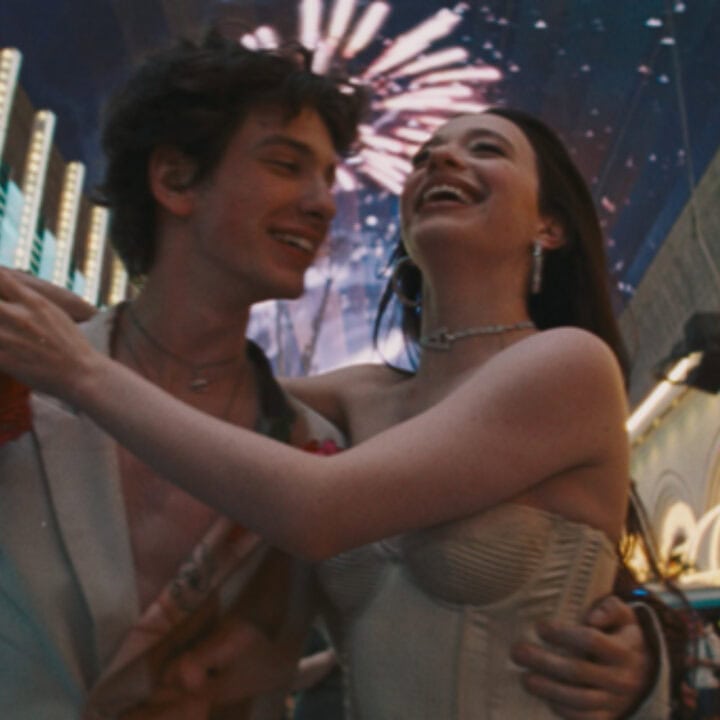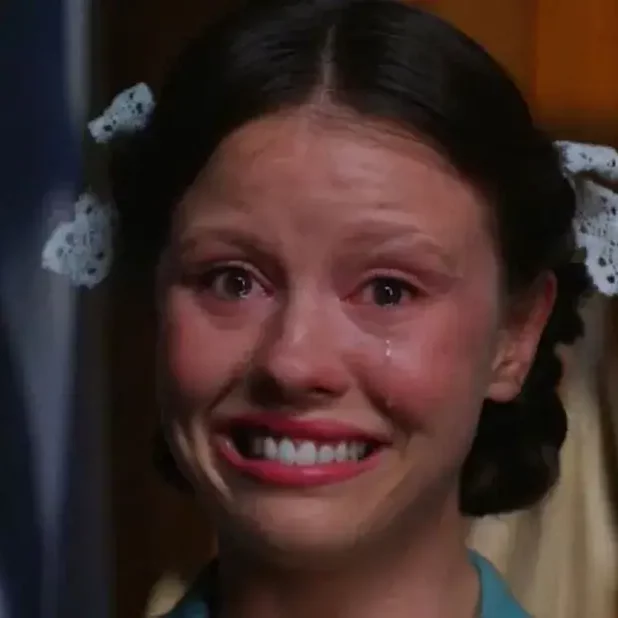
Anora: Exoticism as Empty Currency
Sean Baker’s Anora opens with the glimmer of a deeply human story, weaving survival, sexuality, and power into its frame — yet its gaze risks lingering too long on the surface.
TEXT
Brighton Beach dazzles on screen, but Anora treats its protagonist more as spectacle than a fully realised person. Sean Baker, known for finding poignancy on society’s margins (Tangerine, The Florida Project), follows Ani Mikheeva — a young Russian-American sex worker played by Mikey Madison — as she navigates Brighton Beach’s complexities. Though the film intends to explore agency and identity, Baker’s portrayal confines Ani to archetypes, reducing her to a symbol rather than a nuanced individual.

One of the most compelling aspects of Anora is its setting. Brighton Beach — a slice of Brooklyn soaked in post-Soviet nostalgia and unapologetic grit — feels alive. Its energy is intoxicating, a visual language of rusted fences, cigarette smoke, and an ocean that glimmers with both opportunity and menace. Baker excels in capturing this ecosystem, making Brighton Beach a character in itself. Yet, as immersive as the setting is, it serves as a crutch. Baker uses the location’s eccentricities — the brusque Russian men, the taciturn babushkas – as shorthand for depth, which is never quite delivered. The subculture becomes a prop, reducing Ani’s world to spectacle rather than substance.
Ani’s story is one that could have been richly explored: a second-generation immigrant, emotionally orphaned and trying to make sense of her worth in a world that commodifies every aspect of her being. Mikey Madison’s performance conveys vulnerability and a raw physicality, but the script never allows Ani to become more than her circumstances. Her character is flattened into a vessel for Baker’s broader critique of capitalist exploitation, rather than a nuanced exploration of how women navigate the intersections of poverty, power, and sexuality.

The film gestures at deeper issues: Ani’s isolation, her fraught relationship with her Russian heritage, and her desperation for stability; but these moments are eclipsed by Baker’s penchant for sensationalism. Scenes of strip-club drama and chaotic road trips with her captors are shot with the glossy allure of an action-thriller, detracting from Ani’s humanity. By leaning into her role as an exotic dancer who becomes embroiled in the excesses of oligarchic wealth, Baker misses the chance to explore why Ani’s world operates as it does. The narrative glosses over the systemic forces that push women into sex work, treating Ani’s choices as a given rather than examining the patriarchal, exploitative structures that frame them.
Much like White Lotus or Succession, Anora claims to interrogate class and power but remains complicit in glamorising the systems it critiques. Ani’s body becomes the film’s focal point; her sexuality a tool for both survival and narrative propulsion. Baker’s attempts to humanise Ani often come across as voyeuristic, lingering on her lap dances and her interactions with oligarchic excess without granting her interiority. The camera captures her bruises and broken nails, but the script does little to unpack her pain. Ani isn’t granted agency in her story; she is carried along by the whims of men, from Ivan’s entitlement to her captors’ greed.

There’s an inherent contradiction in the way Baker treats Ani’s sexuality. On one hand, the film acknowledges how women like Ani are forced to wield their bodies as their most immediate commodity. On the other, it indulges in the very objectification it seeks to critique. The result is a narrative that feels exploitative rather than empathetic, framing Ani as an aesthetic object rather than a person with desires, fears, and contradictions. It’s a tired trope in Hollywood storytelling: the exploration of women’s trauma through sexualisation, rather than a meaningful engagement with the systems that produce such trauma.
The film’s structure is uneven, oscillating between moments of tension and stretches of shallow characterisation. Ani’s budding relationship with Ivan, the son of a Russian oligarch, could have been fertile ground for commentary on power dynamics and emotional manipulation. Instead, it’s reduced to a series of montages — private jets, stolen kisses, and drunken parties — that fail to provide insight into Ani’s motivations or emotional state. The kidnapping subplot, while entertaining in its absurdity, feels like a distraction from the film’s core themes.
By the final act, the plot fizzles, leaving threads of Ani’s story underexplored. Her defiance against Ivan’s family — a moment that should mark her reclamation of agency — feels hurried and hollow. Baker’s reluctance to probe deeper into Ani’s psyche renders the finale emotionally inert, offering neither catharsis nor resolution. While some have praised the closing scene for its vulnerability, it lands less as social commentary and more as yet another framing of a woman’s body as spectacle.

Anora is a film of contradictions. It is visually stunning, capturing the chaotic beauty of Brighton Beach with a voyeuristic lens that alternates between awe and critique. The performances, particularly Madison’s, hint at the depth Ani could have had. Yet, the film falters in its inability to move beyond its shiny surface.
For all its lofty aspirations, Anora feels trapped in its own aesthetic, too enamoured with the spectacle of wealth and poverty to truly interrogate the systems that bind them. It’s a film that gestures at feminist themes without committing to them, leaving Ani’s story unfinished and unsatisfying. While Baker’s ambition is evident, his execution serves as a reminder that representation without nuance is just another form of erasure.
In the end, Ani remains as emotionally stranded as when we first meet her, a character who deserved more than the film was willing to give. Perhaps that’s the cruelest irony of all: a story about survival that fails to let its protagonist truly live.
Brighton Beach dazzles on screen, but Anora treats its protagonist more as spectacle than a fully realised person. Sean Baker, known for finding poignancy on society’s margins (Tangerine, The Florida Project), follows Ani Mikheeva — a young Russian-American sex worker played by Mikey Madison — as she navigates Brighton Beach’s complexities. Though the film intends to explore agency and identity, Baker’s portrayal confines Ani to archetypes, reducing her to a symbol rather than a nuanced individual.

One of the most compelling aspects of Anora is its setting. Brighton Beach — a slice of Brooklyn soaked in post-Soviet nostalgia and unapologetic grit — feels alive. Its energy is intoxicating, a visual language of rusted fences, cigarette smoke, and an ocean that glimmers with both opportunity and menace. Baker excels in capturing this ecosystem, making Brighton Beach a character in itself. Yet, as immersive as the setting is, it serves as a crutch. Baker uses the location’s eccentricities — the brusque Russian men, the taciturn babushkas – as shorthand for depth, which is never quite delivered. The subculture becomes a prop, reducing Ani’s world to spectacle rather than substance.
Ani’s story is one that could have been richly explored: a second-generation immigrant, emotionally orphaned and trying to make sense of her worth in a world that commodifies every aspect of her being. Mikey Madison’s performance conveys vulnerability and a raw physicality, but the script never allows Ani to become more than her circumstances. Her character is flattened into a vessel for Baker’s broader critique of capitalist exploitation, rather than a nuanced exploration of how women navigate the intersections of poverty, power, and sexuality.

The film gestures at deeper issues: Ani’s isolation, her fraught relationship with her Russian heritage, and her desperation for stability; but these moments are eclipsed by Baker’s penchant for sensationalism. Scenes of strip-club drama and chaotic road trips with her captors are shot with the glossy allure of an action-thriller, detracting from Ani’s humanity. By leaning into her role as an exotic dancer who becomes embroiled in the excesses of oligarchic wealth, Baker misses the chance to explore why Ani’s world operates as it does. The narrative glosses over the systemic forces that push women into sex work, treating Ani’s choices as a given rather than examining the patriarchal, exploitative structures that frame them.
Much like White Lotus or Succession, Anora claims to interrogate class and power but remains complicit in glamorising the systems it critiques. Ani’s body becomes the film’s focal point; her sexuality a tool for both survival and narrative propulsion. Baker’s attempts to humanise Ani often come across as voyeuristic, lingering on her lap dances and her interactions with oligarchic excess without granting her interiority. The camera captures her bruises and broken nails, but the script does little to unpack her pain. Ani isn’t granted agency in her story; she is carried along by the whims of men, from Ivan’s entitlement to her captors’ greed.

There’s an inherent contradiction in the way Baker treats Ani’s sexuality. On one hand, the film acknowledges how women like Ani are forced to wield their bodies as their most immediate commodity. On the other, it indulges in the very objectification it seeks to critique. The result is a narrative that feels exploitative rather than empathetic, framing Ani as an aesthetic object rather than a person with desires, fears, and contradictions. It’s a tired trope in Hollywood storytelling: the exploration of women’s trauma through sexualisation, rather than a meaningful engagement with the systems that produce such trauma.
The film’s structure is uneven, oscillating between moments of tension and stretches of shallow characterisation. Ani’s budding relationship with Ivan, the son of a Russian oligarch, could have been fertile ground for commentary on power dynamics and emotional manipulation. Instead, it’s reduced to a series of montages — private jets, stolen kisses, and drunken parties — that fail to provide insight into Ani’s motivations or emotional state. The kidnapping subplot, while entertaining in its absurdity, feels like a distraction from the film’s core themes.
By the final act, the plot fizzles, leaving threads of Ani’s story underexplored. Her defiance against Ivan’s family — a moment that should mark her reclamation of agency — feels hurried and hollow. Baker’s reluctance to probe deeper into Ani’s psyche renders the finale emotionally inert, offering neither catharsis nor resolution. While some have praised the closing scene for its vulnerability, it lands less as social commentary and more as yet another framing of a woman’s body as spectacle.

Anora is a film of contradictions. It is visually stunning, capturing the chaotic beauty of Brighton Beach with a voyeuristic lens that alternates between awe and critique. The performances, particularly Madison’s, hint at the depth Ani could have had. Yet, the film falters in its inability to move beyond its shiny surface.
For all its lofty aspirations, Anora feels trapped in its own aesthetic, too enamoured with the spectacle of wealth and poverty to truly interrogate the systems that bind them. It’s a film that gestures at feminist themes without committing to them, leaving Ani’s story unfinished and unsatisfying. While Baker’s ambition is evident, his execution serves as a reminder that representation without nuance is just another form of erasure.
In the end, Ani remains as emotionally stranded as when we first meet her, a character who deserved more than the film was willing to give. Perhaps that’s the cruelest irony of all: a story about survival that fails to let its protagonist truly live.

Enjoyed this story? Support independent gaming and online news by purchasing the latest issue of G.URL. Unlock exclusive content, interviews, and features that celebrate feminine creatives. Get your copy of the physical or digital magazine today!










